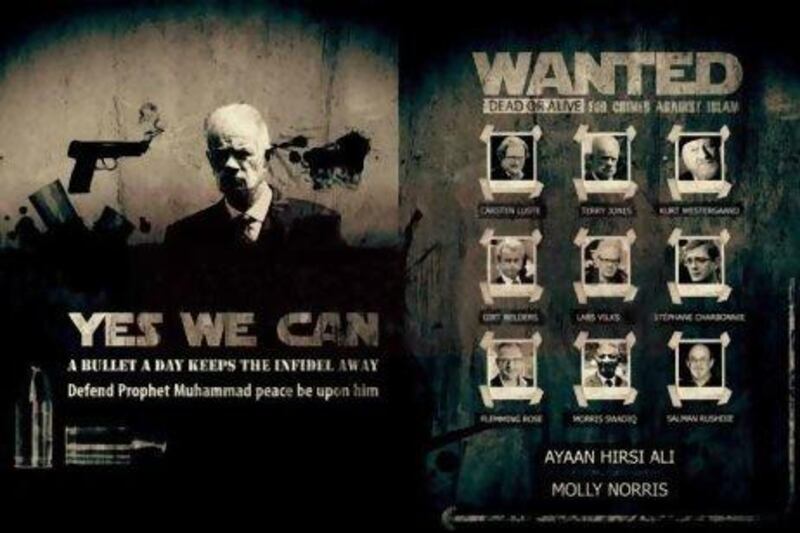MARSEILLE // A hate list of 11 politicians, writers, cartoonists and polemicists accused of insulting Islam has been published by the Yemen-based Al Qaeda in the Arabian Peninsula with a graphic description of them as "wanted dead or alive".
The targets range from Salman Rushdie, still not forgiven for his 1988 novel, The Satanic Verses, to the US pastor Terry Jones, who enraged Muslims with a Quran-burning stunt, and the far-right, anti-Islam Dutch politician Geert Wilders.
The appearance of the 10th edition of the English-language online magazine Inspire, seen as a recruiting tool for Al Qaeda, is of interest to security services and observers of militant Islamism beyond its predictably anti-West content.
Some analysts say it confirms that a number of anglophone westerners are still actively involved in Al Qaeda propaganda despite the deaths of known figures.
In a similar vein, a video message posted on jihadist websites last week featured a man urging Muslims in English and Arabic to give up comfortable lives in the West and join holy wars in Somalia, Mali and Afghanistan. The clip was produced by Al Shabab, a militant group based in Somalia, and the speaker identified himself as Abu Ahmed Al Amriki (the American), according to the Long War Journal, a US site run by the conservative Foundation for the Defense of Democracies.
The hate list published by Inspire is headed by Mr Jones, a minister of the Christian Dove World Outreach Center in Florida, who burnt a Quran in his church sanctuary some months after promising never to do so. His image is prominent, with a gun being fired at his head and the caption: "Yes We Can: A Bullet A Day Keeps the Infidel Away."
Another named target is Geert Wilders: founder and leader of the Dutch Party for Freedo. He has attacked the so-called "Islamisation" of the Netherlands and compared the Quran to Hitler's Mein Kampf.
Several people associated with cartoons insulting Islam and the Prophet Mohammed are also identified, including editors of the Danish newspaper Jyllands-Posten and Dutch, French and US cartoonists who have produced similar drawings. Morris Sadek, an Egyptian-American Coptic Christian accused of spreading the anti-Islam video Innocence of Muslims, is also on the list.
Although none of those on the list is alleged to have committed violence, they are seen as representative of gestures that have led to anger, protests and bloodshed in some Muslim countries.
The magazine's contents have been reported by news monitoring sites specialising in security and conflict. Reports from Saudi Arabia and the US say Inspire has also published advice to militants in a "Lone Mujahid Pocketbook" giving tips on setting fire to parked cars, causing road accidents, destroying buildings and starting forest fires.
Al Qaeda in the Arabian Peninsula has a history of plotting attacks on western interests, including attempts to blow up international passenger aircraft. One graduate of its training operations in Yemen, Umar Farouk Abdulmutallab, was jailed for life in the US last year after being convicted of trying to detonate explosives hidden in his underwear on a Northwest Airlines flight from Amsterdam to Detroit on Christmas Day 2009.
The magazine was produced after the French intervention in Mali and warns Paris to end its involvement, saying adventures in Afghanistan and Iraq had caused the US to "bite their fingertips in regret".
Two editorials focus on the Arab Spring. One is attributed to Adam Yahiye Gadahn, an American convert to Islam who has become a seasoned Al Qaeda propagandist based in Pakistan and wanted by US law enforcement agencies.
He calls on the US not to engage in events in the Middle East and the Maghreb, warning there will otherwise be "a backlash which will make you regret the day you put your hands where they don't belong".
Yahya Ibrahim, described as a cleric, reflects on attacks on US diplomatic missions in Libya, Egypt, Tunisia and Yemen last year. The mob assault on the US consulate in the Libyan city of Benghazi led to the murder of the ambassador, J Christopher Stevens. Ibrahim reports that there were chants of "Obama! Obama! we are all Osama!" and claims the killing by US special forces of Osama bin Laden in May 2011 had not stopped his name inspiring old and new jihadists.
Observers of Al Qaeda activities say the fate of Inspire was initially unclear after the killing of two jihadists in a US drone strike in Yemen in 2011. Samir Khan, of Pakistani origin but brought up in New York, and Anwar Al Awlaki, born to Yemeni parents in the US, were closely associated with the magazine.
Ahmad Ishtiaq, a Pakistani authority on Islam and security and a visiting fellow to St Antony's College at Oxford University in Britain, said the magazine was part of Al Qaeda's attempts to "regain international space".
"I believe Al Qaeda is in retreat after serious blows to their war efforts in the north-western tribal areas of Pakistan, purely because of the drone campaign," he said. "They have lost some key leaders and others have gone into hiding."
He said it was logical that they should seek to extend their influence in the Arabian peninsula and Africa, exploiting popular uprisings originally driven not by Islamist, anti-western sentiment but "temporal issues of employment, equality and greater political freedom".
Dr Ishtiaq added that the involvement of articulate, English-speaking activists was further evidence that the idea of Al Qaeda attracting only poor, ill-educated volunteers was a myth.
* Additional reporting by Reuters






